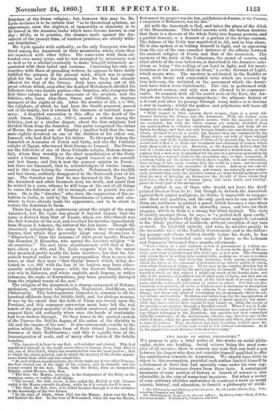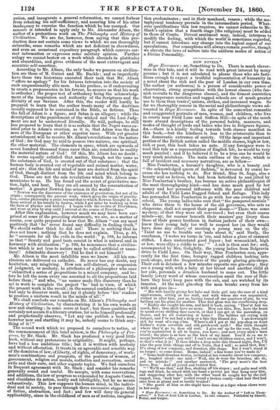TWO BOOKS ON SOCIAL PHILOSOPHIC..
WE propose to give a brief notice of two works on social philo- sophy, under one heading. Social science being the most com- plex of all sciences, there is scarcely any man that can hold a pen between his fingers who does not consider himself qualified to offer his contribution towards its formation. We should have little to object to this assumption, provided each author limited himself to a statement of facts that had specially come under his own cog- nizance, or to inferences drawn from those facts. A sociological treatment of some portion of history or branch of science is also admissible in the ease of competent inquirers. But when a writer of very ordinary abilities undertakes to construct a work on moral
. science, history, and education, to furnish a philosophy of mall-
.. The Philosophy and History of Cirilitation. By Alexander Alison, Esq. Pub- lished by Chapman and Hall. The Philosophy of Progress in Human Affairs. By Henry James Slack, F.0.8., Barrister-at-law. Published by Chapman and Hall. zation, and inaugurate a general reformation, we cannot forbear from rebuking his self-sufficiency, and assuring him of his utter inadequacy to exercise the function which he has usurped. Our censure is intended to apply only to Mr. Alexander Alison, the author of a pretentious work on The Philosophy and History of Civilization. We are far, however, from saying that this pro- duction does not contain some views to which we can thoroughly subscribe, some remarks which are not deficient in shrewdness, and even an occasional expository paragraph which conveys cor- rect information or expresses some salutary opinion. Further eulogy we cannot bestow on a work which abounds in platitudes and absurdities, and gives evidence of the most extravagant and eccentric self-assertion.
According to Mr. Alison, the only books we possess on civiliza- tion are those of M. Guizot and Mr. Buckle ; and so imperfectly have these two historians executed their task that Mr. Alison " offers no apology" for his fatuous intrusion into the society of such unquestionably able men. In his preface, as if endeavouring to create a prepossession in his favour, he assures us that his work is orthodox ; the proper test of orthodoxy being the acknowledg- ment of the inspiration and authority of the Scriptures and the divinity of our Saviour. After this, the reader will hardly be prepared to learn that the author treats many of the doctrines usually supposed to be contained in the Bible, as fictions. Thus the fall of Adam is a figure, and Satan is an allegory ; while the descriptions of the punishment of the wicked and the Last Judg- ment are not be understood literally. He will, perhaps, be still less prepared to learn that it is as certain that the Negro races ex- isted prior to Adam's creation, as it is, that Adam was the first man of the European or other superior races. With yet greater astonishment will he receive Mr. Alison's revelations on the nature of God ; for God may be said to possess two natures, one spiritual, the other material. The elements in space, which are upwards of seven hundred thousand times rarer than air, constitute in reality the material nature of God ! Of this, Mr. Alison has no doubt ; he seems equally satisfied that matter, though not the same as the substance of God, is created out of that substance ; that the human body is created out of vegetable and animal matter, water, and air ; that the life and mind of man are derived from the spirit of God, though distinct from the life and mind which belong to God. These are not the sole revelations which Mr. Alison com- municates to us. He has found out the secret of gravitative mo- tion, light, and heat. They are all caused by the concentration of matter ! A greater Newton has arisen in the world— "Newton was the discoverer of the existence of gravitation, but not of its origin ; consequently the present work, which gives the origin of gravita- tion, carries philosophy a point beyond that to which Newton brought it. Sir Isaac arrived at his results by figures, while I got mine by working up from the facts of physics and history. I began with the events of Providence, and went on step by step until I arrived at the source of Providence."
After this explanation, however much we may have been sur- prised at some of the preceding statements, we are, as a matter of course, now quite prepared to hear that Mr. Alison " can say most positively that he' never found any difficulty in finding truth." We should rather think he did not ! There is nothing that he does not know; nothing that he does not explain. Thus, p. 40,
he " accounts for all the evils in the world : explain.
p. 188, he informs ns that "Beauty and good taste consist in what is natural and in harmony with civilization; " p. 199, he announces that a civiliza- tion which is not true to nature may be called artificial or unna- tural ! Admirable discovery ! Did he find it out himself ? Mr. Alison is the most infallible man we know. All his con- clusions are delivered ex cathedr5.. He never has any doubt, any hesitation, any misgiving. How can self-distrust, or suspension of judgment, or modesty, be attributes of a philosopher who once " submitted a series of propositions to a mixed company, and be- fore he left the room every one assented to all the propositions laid before them ; " and who, "no sooner made this discovery than he set to work to complete the project 'he' had in view, of which the present work is the result ; in the assured confidence that he' had only to discover truth, and lay it plainly before his' readers to produce a uniform result in the minds of all ! "
We shall conclude our remarks on Mr. Alison's Philosophy and History of Civilization, by characterizing it in his own words as new and startling ; in some sense at least ; but these qualities will certainly not secure it a literary ovation, for as he himself profoundly and prophetically observes, "Let any one publish a book now, however new and startling it may be, nobody seems to think any- thing of it ! "
The second work which we proposed to ourselves to notice, at the commencement of this brief review, is the Philosophy of Pro- gress, by Mr. Slack. Mr. Slack has produced a very good little book, without any pretensions to originality. It might, perhaps, have had a less ambitious title ; but it is written with modesty and without affectation. It treats in an agreeable and sensible way of the dominion of law, of liberty, of rights, of democracy, of work- men's combinations and prospects, of the position of woman, of goyernment,religion and morals, aesthetics and recreation, social evils and their cure, and other cognate topics. We find ourselves in frequent agreement with Mr. Slack ; and consider his remarks generally sound and useful. He accepts, with some reservations and additions, the law of progress as expounded by Auguste Comte, and elucidates its action, neatly and intelligibly, but by no means exhaustively. This law supposes the human mind, in the indivi- dual and in society, to pass through three successive stages; that of fiction, abstraction, and fact ; and few will deny its general applicability, since in the childhood of men as of nations, imagina-
tion predominates ; and in their manhood, reason ; while the me- taphysical tendency prevails in the intermediate period. What- ever qualifications this law requires, we cannot subscribe to Mr. Slack's opinion that a fourth stage (the religious) must be added to those of Comte. Devout sentiment may, indeed, interpose to modify the feeling, with which the world is sometimes regarded, but it cannot introduce any change into the logical aspect of our speculations. Our conceptions will always remain positive, though we elevate the laws of nature into the uniform modes of action of a Divine Personality.



























 Previous page
Previous page